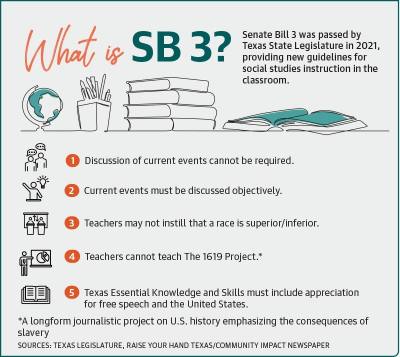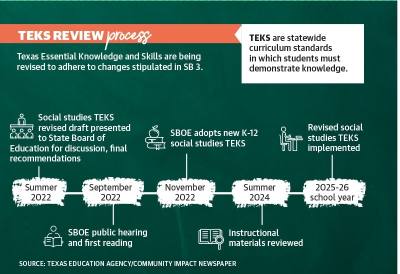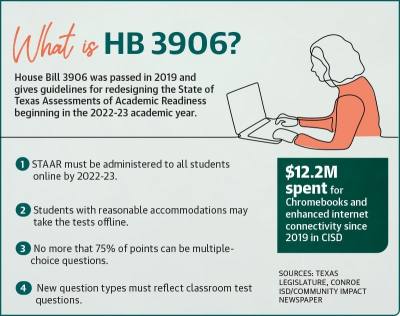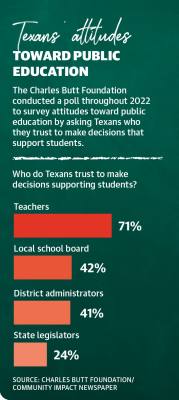Senate Bill 3, which went into effect Dec. 2, provides new guidelines for social studies curriculums and directs the TEA to revise the Texas Essential Knowledge and Skills for social studies to fit these new standards. Another piece of legislation, House Bill 3906, was signed into law in 2019, stating that by the 2022-23 school year, the TEA and school districts should be administering the State of Texas Assessments of Academic Readiness in an online format.
The TEA also released a new library book policy in April emphasizing parents’ participation in selecting library books and stating districts should establish a committee to review books that receive complaints.
CISD officials said the district is working to implement new policies to adhere to state legislation and provide funding to support STAAR’s shift online. In addition, it approved a new library materials policy at its Aug. 2 board of trustees meeting.
CISD Director of Communications Sarah Blakelock said the district is working on how to implement measures such as SB 3.
“Teachers are provided scope and sequences that detail pacing and resources,” Blakelock said. “On topics with multiple perspectives, teachers are provided guidance about how to present facts without bringing in their personal opinion.”
Revising social studies curriculums
The content of SB 3 is based on HB 3979, written by Rep. Steve Toth, R-The Woodlands, Toth said. Toth was also a co-sponsor of the Senate bill. Toth said in an interview that the purpose of the bill was to eliminate discrimination of all kinds in the classroom.
“We want to make sure that what’s taught in the classroom has nothing to do with race but has everything to do with opportunity and believing in the individual,” Toth said.
However, several education advocacy organizations took positions against the bill when it was introduced and still identify issues with the implementation of the bill. Every Texan, an Austin-based public policy organization, along with 43 other organizations issued a joint statement in August condemning the bill, saying it is restrictive and could limit the scope and content of classroom conversations.
Jaime Puente, a public policy analyst for Every Texan, said the bill overrides the process of the State Board of Education and scholars that informs decisions the board makes.
“[The State Board of Education] incorporates the input of education professionals, teachers and scholars,” Puente said. “There’s a lot of work that goes into these standards, and the state Legislature with SB 3 came out and just did away with most of that. ... If they don’t abide by these very narrow frameworks, then you know, districts and teachers ... can be held accountable.”
A study throughout 2022 measuring Texans’ attitudes toward public education conducted by the Charles Butt Foundation shows most Texans trust teachers to make decisions supporting students with 71% saying they trust teachers a “great deal or good amount” as opposed to the local school board, district administrators and state elected officials.
“It shows you where the parental support is for our teachers and the belief they have in our teachers to teach their kids all of the [Texas Essential Knowledge and Skills],” said Bob Popinski, senior director of policy for Raise Your Hand Texas, a sister organization of the Charles Butt Foundation. “That’s someone that the parent sees on a regular basis.”
Popinski said the TEA is going through the process of revising the social studies TEKS, the statewide curriculum dictating what topics students must demonstrate knowledge in, to fit the boundaries of the bill. The revised TEKS must include “key documents and American ideas” and an “appreciation” of the United States, free speech and civil discourse, according to the bill. According to state legislature, the bill will cost about $14 million to implement, but Popinski said it will not have much of a direct financial impact on individual districts.
The bill also states teachers cannot be compelled to discuss current events, and the topic must be presented in an objective way that examines both sides of the issue.
Toth said last November that enforcement will be up to the district, but CISD officials have said the lack of guidance from the state on how to implement the guidelines remains an issue.Puente said he believes the bill has affected teacher morale.
“The teaching profession has been under attack for years. ... They don’t get paid nearly enough, especially considering inflation right now. They are dealing with testing, high-stakes testing; they’re dealing with all of these other systemic issues,” he said.
According to information from the TEA, teacher attrition in the 2021-22 school year was 11.57% statewide, the highest it has been since the figure began being tracked in 2007-08. As of 2020-21, the most recent year available from the TEA for CISD, the district’s turnover rate was 12.1% compared to the statewide average of 14.3%. STAAR transitions online
In addition to changes to school curriculums, the district is continuing its efforts to implement new STAAR procedures in line with laws taking effect this school year.
HB 3906 was the beginning of a longstanding process to redesign STAAR and move it online by this school year. All students—except students who require accommodations that cannot be provided online and students taking the alternate assessment—will be required to take the exams online.
Other elements of the STAAR redesign include adding new item types, placing a cap on the percentage of multiple-choice questions, and eliminating standalone writing exams for grades four and seven.
“This past school year, Conroe ISD worked on addressing the STAAR redesign by introducing teachers to the new assessment types through campus common formative assessments,” said Hedith Sauceda-Upshaw, assistant superintendent for teaching and learning. “We will continue assisting teachers with how to further integrate online assessment tools into their daily instruction to prepare for this year’s online testing.”
The majority of CISD campuses piloted online assessment administrations in the 2021-22 school year in preparation for the full future transition, Sauceda-Upshaw said. Additionally, the district has spent $12.2 million in combined local funds, state instructional materials allotment funds and federal funds such as the Elementary and Secondary School Emergency Relief Fund preparing for the shift since the passage of HB 3906 in 2019, including Chromebooks and enhanced connectivity at campuses.
“While hardware and connectivity infrastructure can be used to support other instructional programming, the primary reason for these expenditures was to put our students in position to successfully take STAAR online,” Sauceda-Upshaw said.
New library policies
In addition to adapting to state requirements, CISD is working to implement new policies for instructional materials and library books this year based on new library standards from the TEA, according to district officials. The board unanimously adopted its new policy Aug. 2 to go into effect immediately.
The new policy splits the previous instructional resources policy into two—one for instructional materials and one for library materials—allowing for separate processes for the review of library materials and classroom instructional materials.
According to the new policy, the formal review process for library materials begins with a written request. Students still have access to the book while it is under review unless the book is under review for violation of the district’s policy of “protection from inappropriate materials.” In that case, the book would only be made available to students with written parental permission.
Upon receiving a request, the new policy states the district library specialist will appoint a review committee made up of one librarian and at least one teacher who is familiar with the material’s content. When a decision is made, the book will either return to the library shelves or be removed, according to the policy.
Parents are unable to restrict what other students check out, but they may request a book be withheld from their own children, and the student will not be allowed to check out that book, district officials said.
Over the last year, some parents have raised concerns at school board meetings about the content in some CISD library that they said violate a Texas law pertaining to distribution of harmful material to a minor.
CISD parent Carolyn Nini spoke about the topic at the Aug. 2 CISD board of trustees meeting.
“The moral upbringing of our children is the responsibility of the parents, not the government nor the school system,” Nini said. “I stand before you no longer requesting that the books be removed but demanding that all sexually deviant books and teaching materials immediately be removed from all CISD schools.”
CISD librarian Amber Sullivan said she believes board meetings over the last year have been an “open attack on librarians.” Sullivan said she works with over 3,400 students every day and has seen the positive effect books can have on helping students cope with difficulties.
“You need to give our high school students a little more credit,” she said. “They deal every single year with having to mourn classmates that die in car accidents, from drug use and from suicide, but you want to remove books that help them process these things because you deem them too obscene?”









